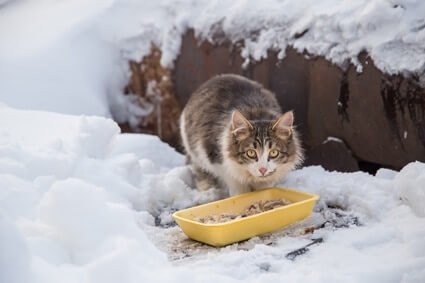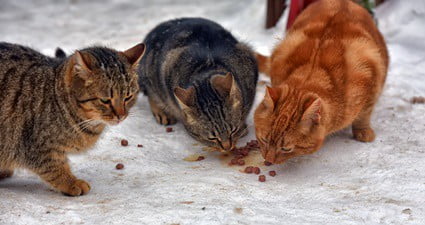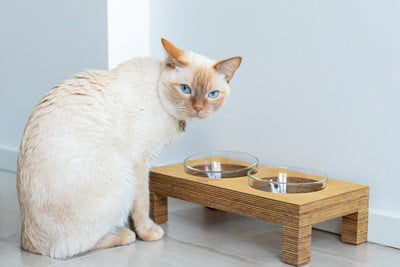During the winter, outdoor cats have an increased appetite, burning calories at an accelerated rate. This is a natural way for cats to maintain their core body temperature. This biological process seems unnecessary for an indoor cat kept in a warm and comfortable environment. Your cat shouldn’t be any hungrier, or so you’d think.
Even indoor cats feel compelled to eat more when it’s cold outside. Cats register the onset of winter based on temperature changes and levels of sunlight exposure. Shorter days and longer nights will cause your cat to believe that cold weather is coming. Your cat will instinctually feel hungrier, asking for additional meals and treats.
You shouldn’t just feed your indoor cat more food. Home temperatures are regulated, so your cat won’t need to raise its body temperature. Your cat’s body will be confused by the different signals, wanting to ingest more calories than it can burn. Of course, eating more food will lead to weight gain, mobility issues, and health problems.
Do Cats Eat More In Cold Weather?
If you notice that your cat seems hungrier throughout the winter season, you’re not imagining it.
All cats experience a sudden increase in appetite during colder weather. This reaction to snow, ice, and rain enables them to cope with changes in the season and fluctuations in their metabolic requirements.
In a 4-year-long study by PLoS One, 38 cats located in a center in southern France were monitored. The cats were allowed to feed freely, while researchers noted their:
- Caloric intake
- Environmental temperature
- Exposure to daylight
The researchers found that cats changed how much they ate depending on the month.
- Cats ate less food during the summer months, from June to August.
- Cats ate the most during the winter, from October to February.
- In the spring and early autumn, they ate somewhere in the middle.
- Cats ate about 15% less food during the summer than they did during the winter.
During the winter, cats burn more energy to maintain their core body temperature.
Of course, calories are derived from food consumption, so a cat’s appetite increases. If it didn’t, its metabolism would slow, its temperature would be reduced, and it would become sick or die.
Is It Normal For Cats To Eat More In The Winter?
Many animals increase the frequency and size of their meals when the temperatures begin to drop.
According to the Canadian Journal of Animal Science, researchers found that lactating cows changed their diet and milk production during lower temperatures.
As the temperatures plummeted, cows would produce less milk per calorie, especially compared to their production in warmer weather.
Aside from insulating a cow’s enclosure or providing more heat, dairy farmers compensated for this by feeding their cows more food during the winter months.
Even humans grow hungrier when it’s cold outside. You might think that it’s because of the freezing weather, but it’s a survival technique. Your body is requesting more energy to remain warm.
If you notice that your cat seems to eat more food in the winter, this behavior is normal and expected. However, indoor cats don’t need to be fed more food during the winter.
Are Cats More Hungry In The Winter?
It’s important to understand how cats know that it’s winter. Cats will eat more than normal due to temperature changes and how much sunlight is available.
Many animals rely on the duration of sunlight to determine which season is approaching. In the same way that birds know to migrate and some reptiles may know to burrow for warmth, cats will know that they need to eat more food.
While your cat will react to temperature changes, it’ll also look out of the window to gauge the season. This change in metabolism is triggered in indoor cats that live in warm homes.
Even if your home remains at 80 degrees Fahrenheit year-round, your cat will still have a higher appetite. There’s no way to circumvent this instinctual change entirely.

Do Cats Need More Food In The Winter?
By knowing how the seasons affect a cat’s metabolism, we can say that some cats don’t need more food during the winter. Cats only need to burn more calories when their environment is cold.
Eating more during the winter is a method for boosting the cat’s internal temperature. However, if the cat lives indoors and enjoys a heated environment, its body temperature will remain consistent.
Nonetheless, your cat may still feel hungry when sunlight changes because it feels as though winter is here. Your cat’s body won’t understand how “winter” doesn’t equate to “cold.” Even the advent of radiators won’t affect its instincts.
Your cat will still try to store up calories to withstand the colder months. The cat won’t be burning these extra calories, so they’ll be converted into fat.
Should You Feed Cats More In The Winter?
Indoor cats don’t need to eat more if your home is kept warm. However, outdoor cats need more energy to burn because they’re exposed to the cold.
Do Indoor Cats Eat More When It’s Cold?
A cat that lives indoors will still feel that it needs more meals during the winter. Cats react to their environment and prepare for when the seasons change on an instinctual level.
Cats correlate the reduction in sunlight to the beginning of winter. Your cat will begin consuming more food to prepare its body for the inevitable drop in temperature.
In your heated living space, this temperature drop never arrives. However, your cat won’t understand. It’ll still feel the need to eat larger meals than normal and more frequently.
Since indoor cats don’t need to ingest more calories, you shouldn’t provide additional meals.
Do You Need To Feed Outdoor Cats More In The Winter?
Outdoor cats feel the cold, and they’ll need more food to keep themselves warm and healthy. So, you’ll need to feed your cat more food if it ventures outside.
When indoors, your cat won’t be expending so much energy, so you won’t need to feed it as much. Some cats may want to stay indoors more often. The colder weather makes them want to snuggle up next to a heater and sleep.
This depends on your cat’s personality. Cats used to being outdoors may want to continue staying outdoors, just out of habit. A cat that’s suddenly cooped up inside a house when it’s accustomed to bigger spaces may become restless, irritable, and unsettled.

Do Cats Fatten Up For Winter?
The only types of animals that purposefully store fat in preparation for cold weather go into hibernation. Neither domesticated nor wild cats fall into this category.
Rather than shutting down their bodies long-term to conserve energy, cats go into torpor. Hibernation is a type of torpor. However, the torpor that non-hibernating animals go through is much shorter. It’s a method for wild cats to survive extremely harsh weather, lasting for no more than a day.
Wild cats in torpor will wake up to continue feeding. Hibernating animals will continue to sleep. Domestic cats, of course, have all their dietary needs and living conditions met by humans. For this reason, they won’t need to hibernate, nor will they fatten themselves up for winter.
However, you may notice your cat sleeping more in the colder months. This is just your cat feeling sleepy because of the colder temperatures and the shorter hours in the day. The longer sleep may be due to the cat’s metabolic changes, but it won’t lead to hibernation.
Of course, domestication introduces new factors that can make cats fatter. For example, indoor cats gain weight in the winter because their owners aren’t anticipating their cats’ increase in appetite. Your cat isn’t fattening up to hibernate; it’s just instinctually confused and eating more than its body needs to survive.

